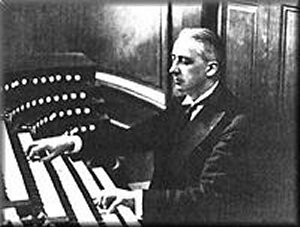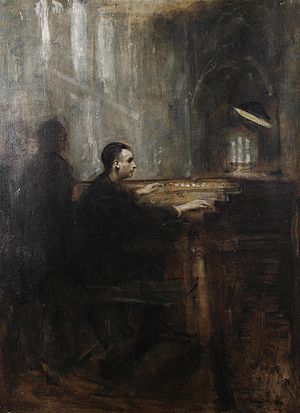Marcel Dupré facts for kids
Marcel Dupré was a famous French organist, composer, and teacher. He was born in Rouen, Normandy, on 3 May 1886. Dupré passed away in Meudon, near Paris, on 30 May 1971. He became known all over the world for his amazing organ playing. He also wrote many pieces of music for the organ.
Contents
Marcel Dupré's Early Life and Education
Marcel Dupré was born in Rouen, France. His family loved music. His father, Albert Dupré, was the organist at the gothic abbey of St Ouen in Rouen. Marcel was a child prodigy, meaning he was very talented from a young age.
In 1904, he joined the Paris Conservatoire. There, he studied the piano and the organ. His organ teachers were some of France's most famous organists. These included Alexandre Guilmant and Louis Vierne. Charles-Marie Widor taught him how to compose music.
Dupré's Career and Achievements
In 1914, Dupré won the Grand Prix de Rome. This was a very important prize for his cantata called Psyché. Twelve years later, he became a professor of organ at the Paris Conservatoire. He held this important job until 1954.
Dupré became famous for giving over 2,000 organ recitals. He performed in Europe, the United States, Canada, and Australia. In 1920, he gave a special series of concerts. He played all the organ works by Johann Sebastian Bach from memory. This made him world-famous.
In 1934, Widor retired as organist at St. Sulpice in Paris. Dupré took over this position. He remained the organist there for the rest of his life.
From 1947 to 1954, Dupré was the director of the American Conservatory. This school was located in the Château de Fontainebleau near Paris. In 1954, he became the director of the Paris Conservatoire. He stayed in this role until 1956. Marcel Dupré died when he was 85 years old.
Marcel Dupré's Organ Playing Style
When Dupré gave organ recitals, he often played his own music. He also played pieces by other composers, especially Johann Sebastian Bach. Like his teachers Widor and Vierne, he wrote long pieces. These pieces had several movements and were called "symphonies."
When he played in church services, he would start with composed music. This music was chosen to fit the time of year. Then, he would improvise. This meant he would make up complicated fugues, trio sonatas, and chorale improvisations on the spot. He was so good at improvising that many people thought he had written the music beforehand.
In concerts, he was often given a tune. Then, he would immediately create a large musical work from that tune. In 1906, when he was still a student, he played for a wedding and two services. This happened when the famous Widor was away. Dupré asked Widor what music he should play. Widor told him to improvise something. Dupré waited for Widor to leave the church before he started practicing. But Widor quietly came back and listened to him. He realized that Dupré would do very well.
Dupré's Influence as a Teacher
Dupré was also very famous as an organ teacher. He taught two generations of well-known organists. His students included Jehan Alain, Marie-Claire Alain, Pierre Cochereau, Jeanne Demessieux, Jean Guillou, Jean Langlais, and Olivier Messiaen.
Marcel Dupré's Compositions
Dupré composed a lot of music for the organ. When he was a boy, he met Aristide Cavaillé-Coll. Cavaillé-Coll was the most famous organ builder in France. He had built the organ that Dupré's father played. So, Dupré was used to the sound of modern French organs.
Most of Dupré's organ music is very difficult to play. One famous work is his Three Preludes and Fugues, Op. 7 (1914). Even Widor thought the Prelude of the third piece was impossible to perform. However, Dupré could play it. Many organists after him also learned to play it. Other important works by Dupré include the Symphonie-Passion, the Esquisses and Évocation, and the Cortège et Litanie.
Besides composing, Dupré also prepared study editions of organ works. These included pieces by Johann Sebastian Bach, Handel, Mozart, Liszt, Mendelssohn, Schumann, César Franck, and Alexander Glazunov. He also wrote music for people learning the organ. Plus, he wrote books on how to improvise on the organ.
See also
 In Spanish: Marcel Dupré para niños
In Spanish: Marcel Dupré para niños
 | Georgia Louise Harris Brown |
 | Julian Abele |
 | Norma Merrick Sklarek |
 | William Sidney Pittman |



